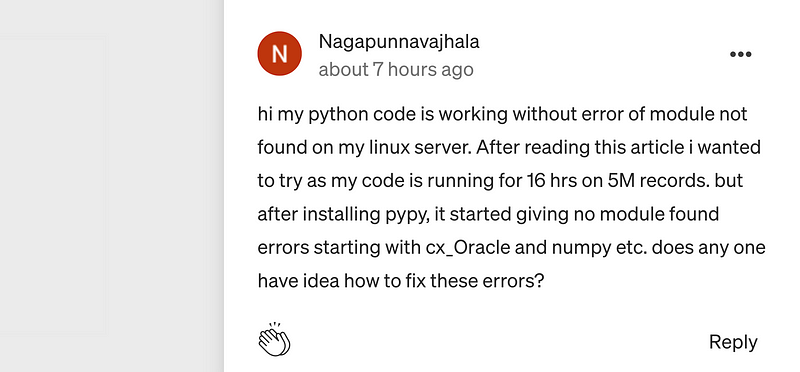Exploring the Trade-offs of Using PyPy for Python Projects
Written on
Chapter 1: Introduction to PyPy
In recent discussions, the performance comparison between PyPy and traditional Python has gained significant traction. An article that has recently gone viral on Medium suggests that by switching to PyPy, users can achieve remarkable speed enhancements without altering their code.

The piece highlights an example where adding integers from 0 to 100,000,000 takes only 0.22 seconds with PyPy compared to 9.28 seconds with standard Python. However, the article overlooks a crucial drawback—PyPy's limited support for many machine learning libraries.
Section 1.1: The Speed Advantage
The allure of PyPy lies in its potential to significantly speed up Python code execution. However, the author fails to mention that while PyPy is faster, this advantage may not extend to all applications, particularly in the field of machine learning.
Subsection 1.1.1: Missing Out on Key Libraries
Many popular machine learning libraries, such as TensorFlow and PyTorch, rely on C API compatibility, which PyPy currently does not support. This oversight is particularly concerning for data scientists looking to optimize training times.

The absence of support for these libraries means that many data scientists may be misled into believing they can achieve substantial time savings. Unfortunately, as evidenced by ongoing discussions on GitHub, the quest for PyPy compatibility with these frameworks is still in its infancy.
Section 1.2: Compatibility Challenges
For instance, the GitHub issue regarding PyTorch compatibility has been open since 2019, illustrating the slow pace of progress in this area. Similarly, TensorFlow users have been advocating for PyPy compatibility since 2015, with little advancement to show for it.
Chapter 2: Current Limitations of PyPy
The first video titled "Python(PyPy) is faster than C++ or NOT!" explores the performance claims of PyPy and evaluates whether it lives up to its reputation.
The second video, "Using PyPy instead of Python for speed by Niklas Bivald," provides insights into the practical applications and limitations of PyPy for speed improvements.
Currently, many machine learning libraries do not function well with PyPy, making it impractical for data science projects. Although PyPy has made strides in supporting libraries like NumPy and Pandas, many crucial tools remain incompatible.
Conclusions
In summary, while PyPy offers impressive speed enhancements for certain Python applications, its current lack of support for essential machine learning libraries presents a significant barrier. If you are considering using PyPy for data science projects, it is vital to verify the compatibility of all required packages first.
Although there is potential for more libraries to support PyPy in the future, this is not expected to happen imminently. For now, it seems prudent to stick with standard Python, especially for projects that rely heavily on machine learning capabilities. Thank you for reading! If you're interested in more insights, check out some of my other articles.
- The One Tool That Every Machine Learning Engineer Should Master
- Maybe It’s Time to Upgrade Your Terminal Experience
- 5 Things I Learned from My First Time Working with Big Data